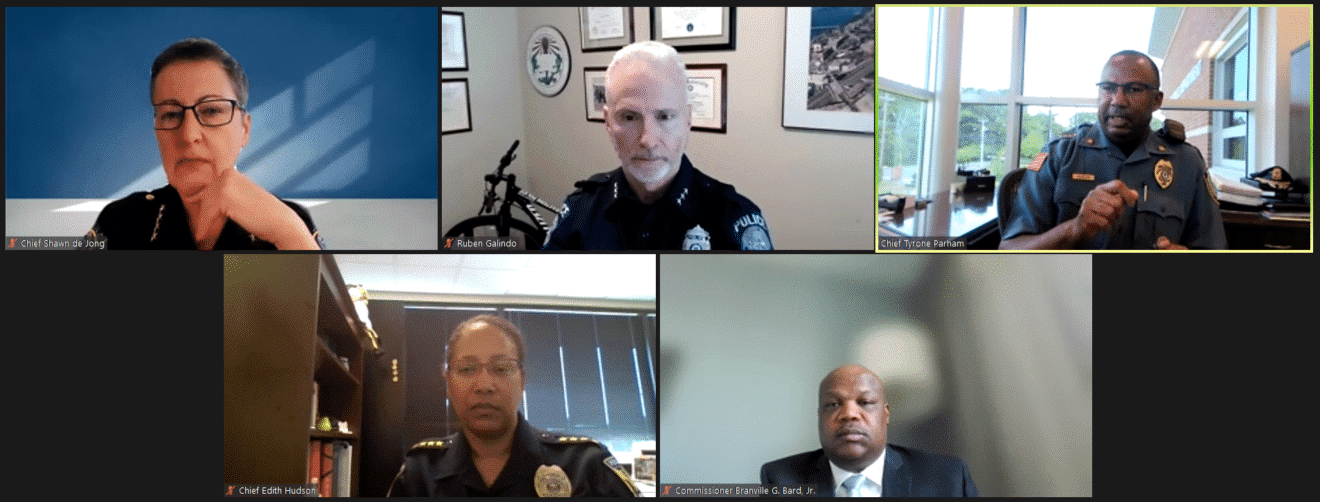The Massachusetts Association of Campus Law Enforcement Administrators (MACLEA) is pleased to share the success of a recent virtual panel.
Coordinated by MACLEA’s Diversity, Equity and Inclusion Committee and moderated by Holy Cross Chief Shawn de Jong, the panel held on Thursday, May 27 featured Cambridge Police Commissioner Branville G. Bard, Jr., Northeastern University Director of Public Safety and Deputy Chief of Police Ruben Galindo, Marquette University Police Chief Edith Hudson and University of Massachusetts Amherst Police Chief Tyrone Parham.
The panel addressed numerous topics around improving relationships with communities, including transparency and accountability, trust, police advisory boards, recruiting and training.
Chief de Jong began the event addressing the challenges facing police departments, including college police departments. She discussed how college police officers are no longer simply security guards, but are very alike to their municipal counterparts in terms of the crimes and incidents they respond to, their training, and the importance of creating and maintaining positive relationships with their campus communities.
The panelists went on to discuss transparency and accountability and the steps their departments have taken to address these needs. Chief Parham discussed a new Accountability and Transparency website the UMass Amherst Police Department launched. The website was a product of demands for change and calls for racial justice by a student-led Racial Justice Coalition following George Floyd’s murder. Chief Parham met with the group multiple times and transparency was an important part of what they wanted from their police department. UMPD launched the site on July 20, 2020.
The panel also discussed various ways of connecting with the community and improving trust. Commissioner Bard discussed the Cambridge Police Family and Social Justice Section, which provides certain services to community members who may be better served through a social justice approach than a conventional criminal justice approach. The department’s Office of Procedural Justice also works to increase transparency and accountability by monitoring data relating to police-citizen interactions.
The panelists also discussed their work with police advisory boards. At Marquette, Chief Hudson is working with the advisory board to create new ways for community members to share feedback, which is currently under development both with the advisory board and Marquette law students. At Northeastern, the advisory board has been up and running for about a year. The board has worked with NUPD on changes to uniforms and complaint systems, and Director Galindo believes the advisory board has significantly helped the department create better relationships with some of the students who are most vocal about changes in policing.
On recruiting, Chief Hudson said in Wisconsin, recruitment in general is difficult at city and college police departments, but even more so when needing to factor in diversity recruitment. She believes the best way to recruit people is to be passionate about the work. Commissioner Bard said Cambridge has seen positive gains in recent years on minority and marginalized recruitment.
Director Galindo discussed how NUPD has started to enter a new phase of its recruitment process by looking at the internal culture of the department. The idea is that people generally want to work at a department where they feel they can enact change and be valued. In terms of diversity, he said while they strive to be a diverse department, it is much more important to find the right candidates, not just people who fit into a particular category. Chief de Jong agreed, saying that when they get to the end of a hiring phase and they look across the table at a potential recruit, they want to see a good human being before wanting to see a potentially good officer.
Another important topic discussed was approaches to training. NUPD has partnered with the Cambridge Police Department to run a regional police academy through the Municipal Police Training Committee (MPTC). Director Galindo discussed the importance of building officers’ socialization within the community starting on day one of training. One of the assignments at the academy includes talking to students, seeing what they may need and following up as necessary. He believes that interactions with people during a response should first and foremost be looked at as an opportunity to learn about their story and their needs.
The panelists wrapped up by discussing the future of campus policing and their hopes for their individual legacies.
“We were thrilled to be able to host this panel and I would like to commend Chiefs de Jong and Parham for their work on MACLEA’s DEI Committee to plan this event,” said Capt. Andrew Turco, MACLEA president and captain at the MIT Police Department. “I would also like to extend my gratitude and appreciation to Commissioner Bard, Director Galindo, Chief Hudson and Chief Parham for taking time out of their day to join us and share their tremendous insight and experiences.”

MACLEA’s panel, hosted virtually on Thursday, May 27, featured (clockwise from top left) Holy Cross Chief Shawn de Jong, Northeastern University Director of Public Safety and Deputy Chief of Police Ruben Galindo, University of Massachusetts Amherst Police Chief Tyrone Parham, Cambridge Police Commissioner Branville G. Bard, Jr. and Marquette University Police Chief Edith Hudson. (Photo courtesy MACLEA)
###



